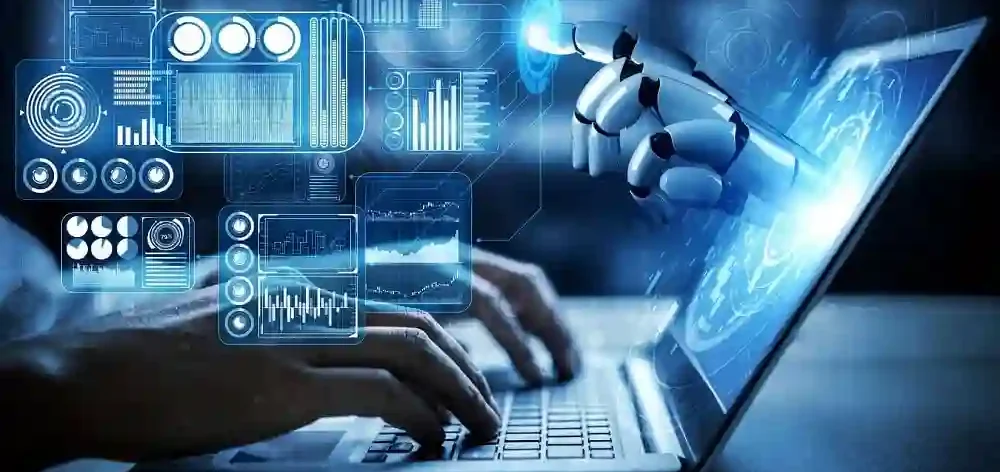Artificial Intelligence (AI) has rapidly evolved over the last few decades, transforming from a theoretical concept to a powerful technology integrated into nearly every aspect of modern life. From healthcare to finance, entertainment to transportation, AI is revolutionizing how we live, work, and interact with the world around us. As we look to the future, it’s clear that AI will continue to evolve, bringing new opportunities, challenges, and ethical considerations. In this article, we’ll explore what the future holds for AI, examining key trends, potential developments, and the impact AI will have on various industries and society as a whole.
1. AI and the Workforce: Automation and Augmentation
Automation Revolution
One of the most talked-about aspects of AI’s future is its impact on the workforce. Automation, powered by AI, is set to revolutionize industries, particularly those that rely on repetitive tasks. In manufacturing, for example, robots have already begun to replace human labor for routine assembly line jobs, and this trend is expected to expand. However, the future of AI in the workforce goes beyond just automating physical tasks.
In industries like customer service, retail, and data entry, AI tools like chatbots, voice assistants, and automated systems are already being used to handle basic tasks. These technologies are expected to become even more advanced, with AI systems able to handle more complex tasks that require reasoning, problem-solving, and even creative input.
Job Creation and Augmentation
While automation may displace some jobs, it is also expected to create new roles and opportunities. AI technologies will augment human abilities, enhancing productivity and efficiency. Instead of replacing workers, AI can assist them by handling the more mundane aspects of their tasks, leaving humans to focus on higher-level, creative, and strategic activities. For instance, AI can help doctors with diagnoses, assist lawyers in reviewing legal documents, or help engineers design more efficient systems.
As AI continues to evolve, there will likely be an increasing demand for professionals skilled in AI and machine learning to build, maintain, and improve these systems. Furthermore, fields like AI ethics, data privacy, and cybersecurity will see growth, as the implementation of AI raises new ethical and regulatory questions.
2. Advances in AI Technology: Deep Learning and Beyond
The Rise of Deep Learning
Deep learning, a subset of machine learning, has already achieved impressive results in areas such as image recognition, natural language processing, and speech recognition. It is anticipated that deep learning will continue to advance, leading to even more accurate AI systems that can perform a wider range of tasks. For example, in healthcare, deep learning algorithms are being used to detect diseases in medical imaging, sometimes outperforming human doctors in accuracy.
The future of AI will likely see the development of even more sophisticated deep learning models that can process complex data in ways that are currently unimaginable. This could lead to breakthroughs in everything from climate change modeling to personalized medicine.
AI and General Intelligence
Currently, most AI systems are considered “narrow” or “weak” AI, meaning they are designed to perform specific tasks, such as playing chess or recommending products. However, the field is moving toward the concept of “general” or “strong” AI, which aims to create machines that can perform any intellectual task that a human can do.
While we are still far from achieving true general AI, the future may bring us closer to machines with human-like cognitive abilities. This could fundamentally change the way we interact with technology and lead to significant advancements in fields like robotics, self-driving cars, and more.
3. AI in Healthcare: Personalized Medicine and Diagnostics
Revolutionizing Healthcare Delivery
AI has already begun to transform healthcare in significant ways. Machine learning algorithms are used to predict patient outcomes, assist in medical imaging, and even discover new drugs. The future of AI in healthcare is incredibly promising, with AI expected to play an even more significant role in diagnosing diseases, developing personalized treatments, and improving patient care.
For instance, AI-powered systems could analyze a patient’s genetic makeup and medical history to create personalized treatment plans. This shift towards precision medicine would allow doctors to offer more effective treatments tailored to the individual, reducing the trial-and-error approach that currently exists.
Early Detection and Diagnostics
AI’s ability to analyze large datasets and identify patterns is especially valuable in diagnostics. For example, AI is already being used to detect early signs of diseases like cancer, diabetes, and heart disease in medical images, often catching issues earlier than traditional methods. In the future, AI could become even more advanced in detecting and diagnosing a wide range of conditions, leading to earlier intervention and better outcomes.
The combination of AI and wearable devices, which monitor health metrics like heart rate, blood pressure, and sleep patterns, could lead to continuous health monitoring and proactive care. These technologies would allow doctors to address health issues before they become serious, potentially saving lives.
4. AI in Transportation: Autonomous Vehicles and Smart Cities
The Promise of Self-Driving Cars
One of the most exciting developments in the AI space is the rise of autonomous vehicles (AVs). While fully self-driving cars are not yet mainstream, significant progress has been made in developing AI systems that can navigate and operate vehicles without human input. Major companies like Tesla, Waymo, and Uber are investing heavily in autonomous vehicle technology, and the future could see widespread adoption of AVs.
Self-driving cars could revolutionize transportation by improving road safety, reducing traffic congestion, and providing mobility for people who are unable to drive due to age or disability. Additionally, AI-powered vehicles could communicate with each other, creating a more efficient and synchronized transportation system.
Smart Cities and AI Integration
In addition to autonomous vehicles, AI will play a crucial role in the development of smart cities. AI systems will be used to manage traffic flow, optimize public transportation, and improve energy efficiency. For example, AI could be used to analyze real-time data on traffic and weather conditions, adjusting traffic lights to reduce congestion and improve air quality.
Furthermore, AI-driven systems will play a central role in waste management, water distribution, and infrastructure maintenance. By integrating AI into the fabric of urban life, cities can become more efficient, sustainable, and livable for their residents.
5. AI and Ethics: Addressing the Challenges
Bias and Fairness in AI
As AI continues to evolve, one of the most pressing challenges is ensuring that AI systems are fair and unbiased. AI algorithms are trained on vast datasets, and if those datasets contain biased information, the AI can inadvertently perpetuate those biases. This is particularly concerning in areas such as hiring, law enforcement, and lending, where biased AI systems can have serious consequences for individuals and communities.
The future of AI will likely involve a greater emphasis on ethical considerations. Developers and policymakers will need to work together to ensure that AI systems are transparent, accountable, and equitable. There will also be an increasing demand for “explainable” AI, where the decision-making process of AI systems is clear and understandable to humans.
Privacy and Security Concerns
As AI systems become more integrated into our daily lives, concerns about privacy and security will also grow. AI technologies, particularly those that rely on personal data, raise questions about data ownership, consent, and the potential for misuse.
For example, AI-powered surveillance systems could be used to monitor people’s movements, activities, and even emotions, raising concerns about privacy infringement and surveillance overreach. In the future, it will be crucial to establish regulations and frameworks that protect individuals’ rights while allowing AI to be used responsibly.
6. AI and Creativity: Enhancing Human Innovation
AI as a Creative Partner
While AI is often associated with automation and efficiency, it is increasingly being used as a tool for creativity. From generating art and music to writing stories and designing products, AI has shown the potential to collaborate with humans in the creative process.
For instance, AI tools like OpenAI’s GPT-3 have been used to write articles, poems, and even scripts. In the future, AI could become a co-creator, helping artists, writers, and musicians unlock new forms of expression and innovation. The combination of human intuition and AI’s ability to process vast amounts of data could lead to groundbreaking work in the arts.
Redefining Innovation
AI’s potential to drive creativity extends beyond traditional artistic fields. In science and technology, AI is already being used to accelerate research and innovation. For example, AI algorithms are helping researchers identify new materials for batteries, design drugs, and even predict climate change patterns.
As AI continues to advance, it will likely become an even more integral part of the innovation process, allowing humans to solve complex problems and create new technologies at a pace never before seen.
7. The Role of AI in Education: Personalized Learning
Transforming the Classroom
AI has the potential to revolutionize education by making learning more personalized and accessible. AI-powered tools can analyze students’ learning patterns and provide tailored educational experiences that meet individual needs. For example, AI tutors can offer real-time feedback, help students with difficult concepts, and adapt to their learning styles.
In the future, AI could make education more accessible to people in remote or underserved areas, allowing them to access high-quality learning resources online. Virtual classrooms powered by AI could break down barriers to education, enabling lifelong learning for all.
Teacher Support
AI won’t just benefit students; it will also play a key role in supporting teachers. AI tools can help educators with administrative tasks like grading and lesson planning, freeing them up to focus on teaching. Additionally, AI can assist in identifying students who may need extra help, allowing for early intervention and improved student outcomes.
Conclusion: The Transformative Potential of AI
The future of artificial intelligence holds immense promise across a wide range of fields. From transforming industries like healthcare and transportation to addressing societal challenges like bias and privacy, AI will continue to reshape the world in profound ways. While challenges remain, particularly in ethics, security, and regulation, AI’s potential to improve lives, enhance creativity, and drive innovation is undeniable.
As we look ahead, the role of AI in our society will only grow, and it is up to all of us—policymakers, businesses, and individuals—to ensure that this technology is used responsibly and ethically. By embracing AI’s transformative potential and addressing its challenges, we can shape a future that is not only more efficient and productive but also more equitable and inclusive for everyone.





